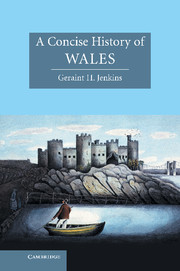Book contents
- Frontmatter
- Contents
- List of illustrations
- Preface
- 1 The earliest inhabitants
- 2 The Heroic Age, 383–1063
- 3 The Anglo-Norman conquerors, c. 1063–1282
- 4 Pestilence, rebellion and renewal, c. 1283–1536
- 5 Early modern Wales, 1536–1776
- 6 A crucible of the modern world, 1776–1900
- 7 Wales awakening? 1901–2006
- 8 Whither Wales?
- Sources of quotations
- Guide to further reading
- Index
- CAMBRIDGE CONCISE HISTORIES
3 - The Anglo-Norman conquerors, c. 1063–1282
Published online by Cambridge University Press: 05 June 2014
- Frontmatter
- Contents
- List of illustrations
- Preface
- 1 The earliest inhabitants
- 2 The Heroic Age, 383–1063
- 3 The Anglo-Norman conquerors, c. 1063–1282
- 4 Pestilence, rebellion and renewal, c. 1283–1536
- 5 Early modern Wales, 1536–1776
- 6 A crucible of the modern world, 1776–1900
- 7 Wales awakening? 1901–2006
- 8 Whither Wales?
- Sources of quotations
- Guide to further reading
- Index
- CAMBRIDGE CONCISE HISTORIES
Summary
In May 1900 Professor John Edward Lloyd of Bangor delivered a lecture, entitled ‘Wales and the coming of the Normans’, to the Honourable Society of Cymmrodorion in London. Dressed in an immaculate dark grey suit and with his high collar, shirt front and cuffs heavily starched, Lloyd spoke with the austere elegance and luminous clarity of the quintessential Victorian don, and even at this early stage in his career the superior talents of a historian who later became known as ‘the lantern-bearer of the lost centuries’ were widely appreciated. Although Lloyd was not the most inspiring lecturer – he preferred, for instance, to say ‘King Henry dismounted from his steed’ rather than ‘Henry got off his horse’ – he had an unsurpassed knowledge of his field and an unflagging desire to raise intellectual standards. Indeed, Lloyd was the founding father of Welsh medieval studies. His address to the Cymmrodorion provided a foretaste of his magisterial two-volume A History of Wales from the Earliest Times to the Edwardian Conquest, published in 1911, a work which stands as a major landmark in the historiography of Wales. Whereas his predecessors had written from their hearts rather than with their heads, Lloyd turned the history of medieval Wales into a serious academic exercise. His work still occupies a hallowed place in Welsh historical writing, and scholars continue to consult his books with profit and pleasure.
- Type
- Chapter
- Information
- A Concise History of Wales , pp. 63 - 95Publisher: Cambridge University PressPrint publication year: 2007



